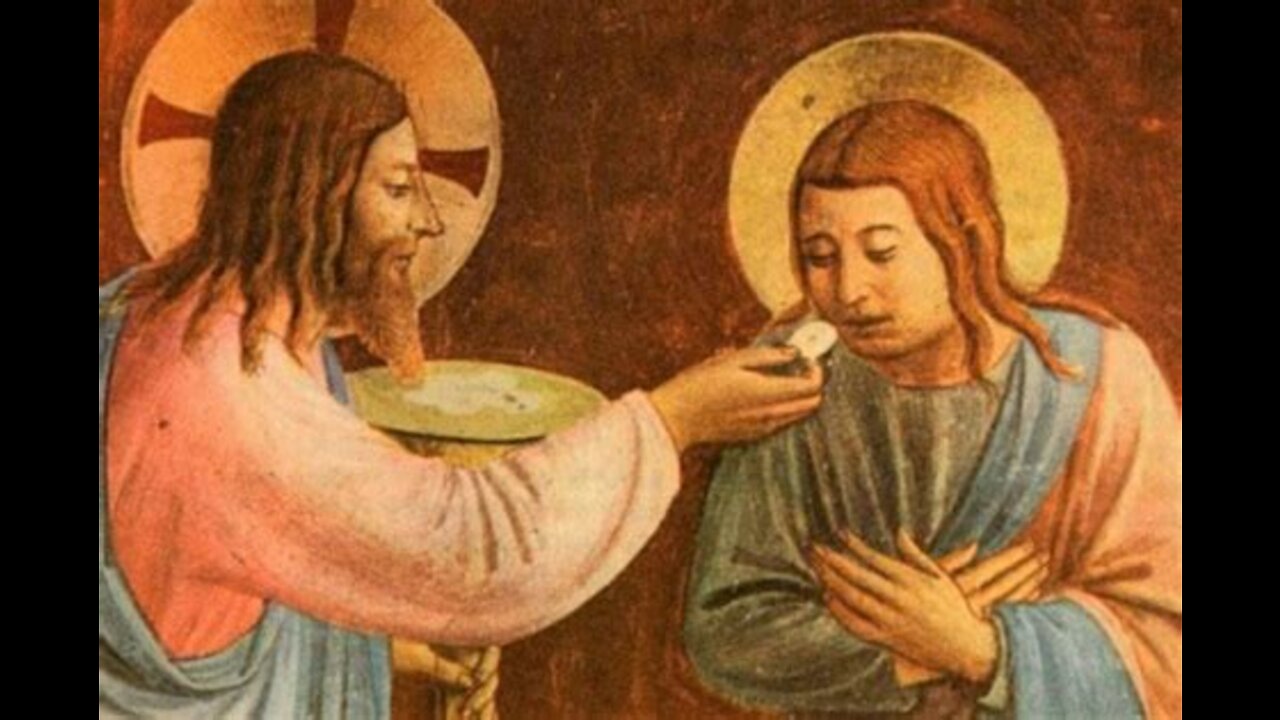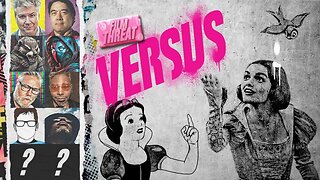Premium Only Content

Eucharist III
III New Testament, pride of place, direct command by Our Lord in remembrance of Him, inspired by Holy Spirit, inerrant, and chronological Jn 6 & Paul in 1 Cor essential texts
Protestant realizing importance of Communion, sometimes daily, with special rules, blessing altar, ritual and sacramentality, pointing to what did our Lord do, and apostles do
New Testament at least his essential rite:
1. Bread & wine are brought to the altar
2. The celebrant gives thanks
3 He takes the bread, blesses it and says the words of Institution.
4. He does the same over the wine
5 The bread is broken, it and the consecrated wine are given to the people (aposltes) in Communion
Near Eastern tradition putting first morsel on tongues, kneeling as bishops, first morsel on tongues
Jn 6 Much to highlight, however limit ourselves to a few considerations with a view to the liturgy
- JC compares himself to manna NOT the lamb. Bread of Life discourse.
- Jews scandalized by carnal words of body, eat, flesh, chew
- John aware of paschal interpretation of JC death (Jn 1:29, 19:14, 19:36)
1 Cor Paul handed on what he received
Gal 2:1-10; 1 Cor 9:1-6 Paul cooperates with other communities
1 Cor 11:23-27
1. Lord’s supper is a sacrificial meal
2. Lord supper connected to Passover but not identical
3. Lord supper rooted in night He was betrayed
Communal bread breaking Acts 2:42, 20:7 and Luke 24
Distinct from the Sabbath, The Lord’s Day Act 20:7, 1 Cor 16:2
Hebrews 13;10 altar (note the retention of phrase ‘altar call’)
Rev 4:6-11 Resemblance to Eucharistic prayers
Summary of NT sources for synagogue services, assemblies of Christians, in the morning distinct from the Eucharist
1. Special Day, Sunday (Acts 7:1, 1 Cor 16:2)
2. Readings from holy books (Act 13:5, 1 Tim 4:13, 1 Thess 5:27, Col 4:16)
3. Sermons (1 Cor 14:26; Acts 20:7)
4. Sang Psalms (1 Cor 14:26) and hymns (Eph 5:19, Col 3:16)
5. Intercessory Types Prayers for the People (1 Tim 2:1-2, Acts 2:42)
6. Profession of Faith (1 Tim 6:12)
7. Kiss of Peace (rom 16:16, 1 Cor 16:20, 1 Thess 5:26, 1 Pet 5:14)
8. Collections of alms for the poor (Rom 15:26, 1 Cor 16:1-2, 2 Cor 14:10-13)
The Eucharist Proper
1. Prayer of Thanksgiving (Lk 22:19, 1 Cor 16:23, 14:16, 1 Tim 2:1)
2. Blessing of Bread & Wine by words of Institution (1 Cor 10:16, Mt 26:26-28, Mk 14:22-24, Lk 22:19-20, 1 Cor 11:23)
3. Prayers remembering Christ’s death (Acts 2:42, Lk 22:19, 1 Cor 11: 23, 25, 26)
4. The people eat and drink the consecrated bread & wine (Mt 26:26, 27; Mk 14:23,23; 1 Cor 14:26-29)
Ignatius of Antioch, first century, lions grinding hie flesh, Greek word the same
“I am writing to all the Churches and I enjoin all, that I am dying willingly for God's sake, if only you do not prevent it. I beg you, do not do me an untimely kindness. Allow me to be eaten by the beasts, which are my way of reaching to God. I am God's wheat, and I am to be ground by the teeth of wild beasts, so that I may become the pure bread of Christ.”
Not a Eucharist at every celebration, but when it was it was joined to the Christianized Synagogue service, coming at the end
This basic outline is the shape of all liturgies formed from the Scriptures not the laws of medieval Popes.
IV Ignatius of Antioch c. 35-107
Wrote 7 letters en route to martyrdom in ROME during reign of Trajan
Rome is undisputed center of Christianity, martyrdom of Peter & Paul. Alexandria, Antioch, and Constantinople were the other prominent communities.
Desire “bread of God, flesh of JC, seed of David and for drink His blood which is imperishable love”
- One Eucharist, one cup, one altar. Altar had a sacrificial meaning. (Philadelphians 4.1; also Ephesians 20.2).35 The repeated mention of an altar (θυσιαστήριον; Ephesians 5.2; Trallians 7.2; Magnesians 7.2) indicates a sacrificial understanding
- An event to be offered only in communion with the bishop and not a common meal. Note hierarchy already in place.
“Let that eucharist be considered valid that occurs under the bishop or the one to whom he entrusts it” (Smyrneans 8.1; also Ephesians 5.2-3; Trallians 7.2).”
Uncommon sacred meal, medicine brings immortality
Ignatius describes the Eucharist as “a medicine that brings immortality, an antidote that allows us not to die but to live at all times in Jesus Christ” (Ephesians 20); being “the flesh of our savior Jesus Christ, which suffered on behalf of our sins” (Smyrneans 7.1; cf. John 6:53-69).
Unites believers by their partaking (Smyrneans 8.1; Ephesians 20.2)
-
 11:35
11:35
Fides et Ratio
11 months agoIgnatius’ Rules for Discernment Journey to God III
46 -
 15:24
15:24
Russell Brand
3 hours agoDan Crenshaw Addresses Tucker Carlson Beef
33.1K85 -
 LIVE
LIVE
Film Threat
23 hours agoVERSUS: THE SNOW WHITE STORM IS COMING | Film Threat Versus
404 watching -
 11:07
11:07
Silver Dragons
2 hours agoDid Gold REALLY Hit $3,000? How is the REAL Spot Price Determined?
3.9K3 -
 2:11:47
2:11:47
The Quartering
6 hours agoTrump & Putin Meet, Tesla Psycho's FAFO, Journo SMACKS Trump In Face, COVID BOMBSHELL & Moree
168K60 -
 1:16:41
1:16:41
Sean Unpaved
4 hours agoPayday In Cincinnati For Chase & Higgins; NCAA Madness Bracket Predictions!
21.1K1 -
 2:02:40
2:02:40
Right Side Broadcasting Network
7 hours agoLIVE REPLAY: White House Press Secretary Karoline Leavitt Holds a Press Briefing - 3/17/25
124K47 -
 1:09:42
1:09:42
Tucker Carlson
4 hours agoRick Sanchez: Fired and Threatened With Jail for Refusing to Spout Zelensky’s Talking Points
88K54 -
 1:12:42
1:12:42
Mark Kaye
5 hours ago🔴 TRUMP Claims Biden Autopen Pardons are Null and Void!
39K10 -
 1:04:03
1:04:03
Timcast
5 hours agoDemocratic Party IS DEAD, Poll Shows COMPLETE Collapse Of Support, Trump Support STABLE | Timcast
210K94